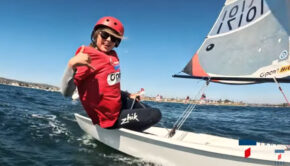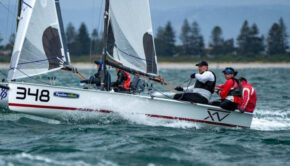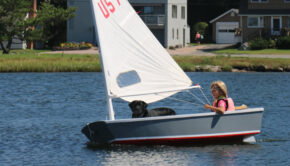In My Ideal Race Management World
Published on March 24th, 2014
by Tom Duggan, ISAF International Race Officer/US Sailing National Race Officer
When it comes to being your Race Officer, here is what I hope to find in my ideal race management world…
1. There would always be homemade chocolate chip cookies on the start boat.
2. Race Committees wouldn’t call anyone OCS unless they were absolutely sure. Period. No if’s, and’s, or but’s.
3. Protest Committees would follow a policy that a competitor must prove ‘an error or omission’ by the Race Committee (just like the rule states) in any redress. No fishing expeditions allowed. No requiring the Race Committee to prove that they are correct – unless there are extraordinary circumstances (you never know, sometimes stuff happens), such as the competitor was actually not near the start line at the start and/or the RC might have called the wrong sail number. If the competitor was on or about the start line at or about the start time, the onus would be on the competitor to prove that the Race Committee’s call was not correct. The competitor should be allowed to make their case – no one should be denied the right to redress – so the competitor can feel comfortable that there is another body available to review their situation, should they desire.
4. The above policies would be followed by both Race Committees and Protest Committees – and both would have a ‘tie goes to the runner’ attitude to be sure competitors receive the benefit of doubt if circumstances so dictate.
5. Race Committees would always be happy to meet with competitors to allow them to listen to the line sighter’s tape recording of the start.
6. Race Committees would always be happy to help competitors (even to the point of requesting redress on the competitor’s behalf) if they found that they made any sort of an error that negatively affected a competitor’s position in a race.
The business of calling boats OCS is one of certainty. Ordinarily we should – and we can – be sure. We train Race Officers to call over only the boats they are sure of. Period. And yes, on occasion, that results in a boat that is over early not being called, but it should not result in a boat being penalized that is not over early.
Regarding the situation where one end of a start line becomes obscured, Race Officers all have their own way to call that line, but no method should allow for the kind of guesswork that would result in the Race Officer not being sure that any boats he or she called over were – in fact – over.
In particular, I would not advise anyone to try to call a start line over a long period of time while looking through a hand held compass to try to remember where the start flag was – especially from a small rocking pin end boat. Different Race Officers use different methods – such as sometimes having a perfect land sight – but, failing that, my practice is that, once the flag has been obscured for more than a second or two, I base any further OCS calls on the position of the boat that obscured the flag.
So, a boat that pulls up alongside (or passes) the boat that obscured the flag is obviously over. A boat that is bow to traveler on that boat is not obviously over. And I will only make those calls for a short period of time (if boats obscure the line for a long period of time – it’s not usually the kind of start I want to keep, anyway). After that, I stop calling numbers and decide whether it is a good start or if it is, in fact, a jailbreak – with too many boats most probably OCS undetected – and the start needs to be postponed or recalled.
So in the simple case I just made, the original boat is called OCS, the boat alongside or past is called OCS, the boat bow to traveler is not called OCS. Standard practice on our start lines is – we don’t make any OCS calls that we can’t be sure of – and defend successfully in the room if necessary. NO CLOSE CALLS, NO PROBABLIES, NO MAYBES. I’m from New England, so I think of this like catching lobsters – too small, throw ’em back. In line sighting – too sketchy, throw ’em back.
But sometimes stuff just happens, and you allow the system to work. You chalk it up to experience, make sure to learn from it, and move on. In the future there will be an affordable method of electronic OCS detection. I’m sure all Race Officers and sailors will welcome it. In the meantime we will try as hard as we can to do the best we can with what we’ve got.









 We’ll keep your information safe.
We’ll keep your information safe.